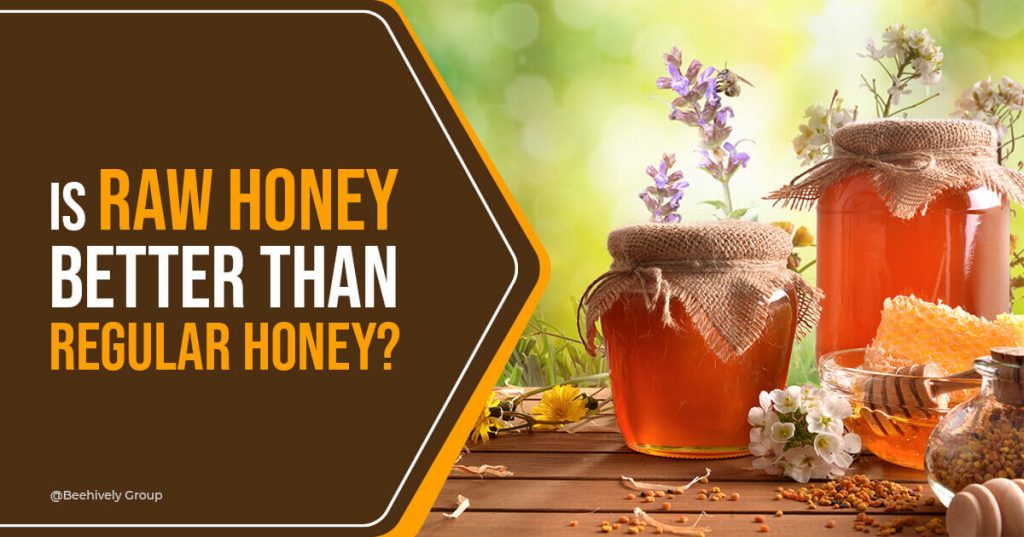A lot has been said about honey, its purity, and the innumerable health benefits of this natural sweetener. Multiple research papers have proved what the ancient people believed about honey possessing exceptional healing and medicinal properties. The sweet syrup produced by bees is one of the most widely used home remedies for several common problems like cough, fever, cold, sore throat, skin problems, burns, rashes, and more. It has also been the preferred ingredient for boosting immunity during the ongoing COVID-19 pandemic. However, many believe that only the raw, unprocessed version of honey possesses these qualities, and pasteurization or excessive heating can kill its medicinal benefits. Let’s find out what sets raw honey apart from regular honey.
Raw Honey
As the name signifies, raw honey is unprocessed and untreated honey, bottled almost straight from beehives and honeycombs. Pure honey only goes through a filtering process to remove impurities like dead bees, beeswax, and debris using either a mesh or a cloth. The opaque and cloudy texture is due to the presence of various natural and essential elements. Raw honey is often thought to be a synonym of organic honey, which can be confusing because the latter may be processed and pasteurized while raw/pure honey isn’t. The similarity between the two lies in the absence of additives and artificial agents that may be found in regular store-bought honey.
Regular Honey
On the other hand, regular honey, widely available in supermarkets, undergoes ultra-filtration and pasteurization at extremely high temperatures to kill pathogens and yeast. Besides giving a clear and uniform appearance to honey, the pasteurization process helps boosts its shelf life. However, heating honey at high temperatures diminishes the percentage of nutrients and antioxidants in it.
[read more about pros or cons of heating honey]
Raw Honey vs. Regular Honey
Here are some of the major differences between the two types of honey.
Nutritional Qualities: Over the years, various pieces of research have proved that raw honey is more nutrition-rich because it is loaded with vitamins, enzymes, amino acids, and over 30 different types of minerals. It also contains bioactive plant compounds called polyphenols that offer antioxidant properties. These antioxidants make honey capable of reducing inflammation and lower the risk of heart disease. Pasteurization methods may cause honey to lose its antioxidants, which in turn causes it to lose its health benefits.
1. Presence of Bee Pollen and Propolis
Bee pollen, a food source for bees and propolis, is an extremely nutritious bee by-product containing vitamins, essential fatty acids, amino acids, micronutrients, and antioxidants, helping cure inflammation and liver problems and fight heart diseases. And as for propolis, it boasts vitamins, enzymes, magnesium, and potassium which are responsible for its antifungal, anticancer, antiulcer, and anti-inflammatory properties. Ultrafiltration and pasteurization can remove bee pollen and propolis from honey, thus depriving regular honey of their health benefits.
2. Additives and Artificial Sweetening Agents
Regular honey can be contaminated with artificial sweetening agents like high fructose corn syrup and additives. This not only reduces the nutritional benefits and medicinal properties of honey but also makes it harmful for excessive use. As for raw honey, it is exactly what exists inside a beehive and contains no artificial sweetening agent.
Identifying Raw Honey
The most telling feature when buying honey is its appearance. As mentioned above, raw honey tends to have a more opaque and cloudy appearance as opposed to regular honey which is clear and smooth. Crystallization is another property that can help you identify it. Raw honey crystallizes faster than regular honey and can simply be placed in warm water or in the sun to bring it back to its liquid form.
When buying honey, look for raw honey on the label. Premium honey suppliers like BeeHively Group offer unpasteurized natural honey procured using only sustainable and ethical methods of beekeeping by tribal beekeepers. Acquired from the forests of India, Bhutan, and Nepal, BeeHively honey is available in various flavors such as eucalyptus, acacia, neem, ajwain, litchi, multiflora, and many more.




